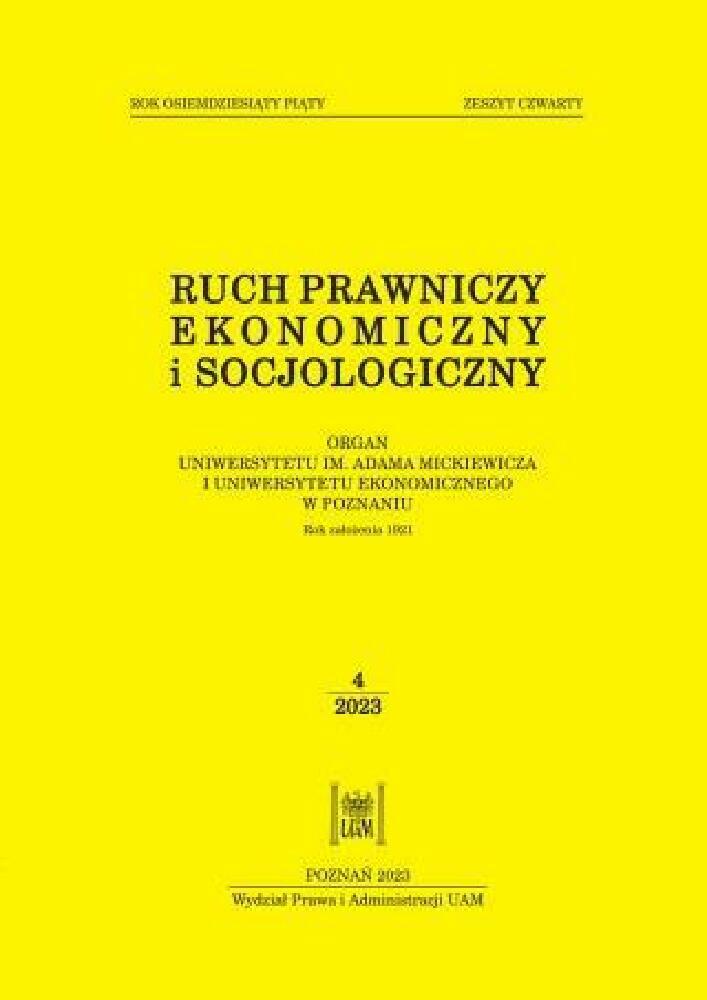Abstract
The article discusses the issue of regulations governing the roles of members in the management bodies of companies. The rationale for conducting the research was that European countries have not adopted a uniform model regarding the participation of legal entities in the management bodies of companies. An unsuccessful attempt at such regulation was the Fifth Directive on Companies. The research aimed to compare selected legal systems and emphasize the potential consequences of allowing legal entities to hold positions on the management board, as well as to address the question of whether the standardization of regulations pertaining to this issue is necessary at the European level. This analysis was primarily conducted using the legal dogmatic and comparative legal methods. The research demonstrated that in some legal systems the presence of a legal entity in the management body of a company is widely permissible – for instance, this is allowed by the French, Belgian, and British legislators, although the legislation of these countries is not uniform in this aspect. On the other hand, in Germany and Poland the participation of legal entities as members of the management board is prohibited by the law itself. The author formulates the thesis that there are no specific grounds for harmonizing the described mechanism at the European level. The conclusions drawn can be deemed significant in the context of a potential amendment to the Polish Commercial Companies Code, which could reignite the discussion about the possibility of introducing regulations concerning the capacity of legal entities to hold positions in a company’s management bodies.
Funding
This article is a result of a grant ID-UB UAM named „ID-UB Study@Research”
References
Abriani, N. (2003). Conflitto di interessi e rappresentanza nella nuova società a responsabilità limitata. The Sociétés: 416-422.
Andersen, P.K., Andersson, J.B., Bartkus, G. et al. (2017). European Model Company Act (EMCA). First Edition, Nordic & European Company Law Working Paper No. 16-26.
Bainbridge, S. (2017). Corporate directors in the United Kingdom. 59 William and Mary Law Review Online 65. UCLA School of Law, Law-Econ Research Paper No. 17-04. https://ssrn.com/abstract=2935388
Bainbridge, S., Henderson, T. (2018). Outsourcing the Board: How Board Service Providers Can Improve Corporate Governance. Cambridge: Cambridge University Press. DOI: https://doi.org/10.1017/9781108149792
Bainbridge, S., Henderson, T. (2014). Boards-R-Us: Reconceptualizing Corporate Boards. University of Chicago Coase-Sandor Institute for Law & Economics Research Paper No. 646, UCLA School of Law, Law-Econ Research Paper No. 13-11: 1051-1118.
Bianchi, G. (2006). Gli amministratori di società di capitali. Padova: Cedam.
Bilewska, K. (2004). Udział osób prawnych w organach spółek kapitałowych. Palestra 49(3/4): 108-114.
Bolognesi, F. (2018). Questioni in tema di amministratore di società persona giuridica. Rivista del Notariato 1: 2: 174-192.
Busani, A. (2006). S.r.l. Il nuovo ordinamento dopo il D.lgs. 6/2003. Milano: Egea.
Dziurda, M. (2021). Komentarz do art. 38. W: J. Gudowski (red.), Kodeks cywilny. Tom 1 (s. 685–702). Warszawa: Wolters Kluwer.
Dziurzyński, T. (1936). Komentarz do art. 195. W: T. Dziurzyński, Z. Fenichel Z., M. Honzatko, Kodeks handlowy. Tom 1: Komentarz (s. 224–227). Kraków: Księgarnia Powszechna.
Fleischer, H. (2004). Der Einfluss der Societas Europaea auf die Dogmatik des deutschen GesellSchaftsrecht. Archiv für die civilistische Praxis 204: 502-543. DOI: https://doi.org/10.1628/000389904780603058
Frąckowiak, J. (1999). Komentarz do art. 366. W: A. Kidyba, K. Kruczalak, W. Pyzioł, I. Weiss, J. Frąckowiak (red.). Kodeks handlowy (s. 517–520). Warszawa: Wydawnictwo Prawnicze PWN.
Gburzyńska, A. (1997a). Członkostwo w zarządzie spółek kapitałowych. Przegląd Prawa Handlowego 1997(2): 15-19.
Gburzyńska, A. (1997b). Reprezentacja spółek kapitałowych. Warszawa: Wydawnictwo Zrzeszenia Prawników Polskich.
Grzybowski, S. (red.) (1985). System prawa cywilnego. Część ogólna. Tom 1. Wrocław, Warszawa, Kraków, Gdańsk: Zakład Narodowy imienia Ossolińskich, Wydawnictwo Polskiej Akademii Nauk.
Hanningan, B. (2016). Company Law. 4th edn. Oxford: Oxford University Press.
Hüffer, U. Koch, J. (2020), Aktiengesetz, § 76 Rn. 58. Monachium: Beck.
Möslein, F. (2017). Robots in the boardroom: artificial intelligence and corporate law. W: W. Barfield, U. Pagallo (eds.), Research Handbook on the Law of Artificial Intelligence (s. 649–671). DOI: https://doi.org/10.4337/9781786439055.00039
Naworski, J.P. (2011). Komentarz do art. 18. W: R. Potrzeszcz, T. Siemiątkowski (red.), Kodeks spółek handlowych. Tom 1 (s. 188–193). Warszawa: LexisNexis.
Opalski, A. (2016). Komentarz do art. 301–392. W: A. Opalski (red.), Kodeks spółek handlowych. Tom IIIA. Warszawa: C.H. Beck.
Oplustil, K. (2002). Europejska spółka akcyjna. Teksty aktów prawnych z omówieniem. Warszawa: Prawo i Praktyka Gospodarcza.
Pescatore, G. (2012). L’amministratore persona giuridica. Milano: Giuffre.
Płonka, E. (1991). Osoba prawna jako członek zarządu spółki kapitałowej. Państwo i Prawo 46(5): 61-71.
Radwański, Z. (1993). Prawo cywilne. Część ogólna. Warszawa: C.H. Beck, PWN.
Rudnicki, R. (1999). Osoba prawna jako organ innej osoby prawnej. Prawo Spółek 10: 14–20.
Sokołowski, J. (2003). Monistyczny system zarządu w Europejskiej Spółce Akcyjnej – wyzwanie dla polskiego ustawodawcy. Prawo Spółek 12: 9-16.
Strugała, R. (2021). Komentarz do art. 38. W: E. Gniewek, P. Machnikowski (red.), Kodeks cywilny (s. 86–92). Wyd. 10. Warszawa: C.H. Beck.
Szwaja, J. (1998). Komentarz do art. 379. W: S. Sołtysiński, A. Szajkowski, J. Szwaja, Kodeks handlowy. Komentarz. Tom 2 (s. 588–609). Warszawa: C.H. Beck.
Talens, P. del Val. (2017). Corporate directors: in search of a European normative model for legal persons as board members. European Company and Financial Law Review 14(4): 609-636. DOI: https://doi.org/10.1515/ecfr-2017-0028
Vicari, A. (2021). European Company Law. Berlin, Boston: Walter de Gruyter. DOI: https://doi.org/10.1515/9783110725025
Wanka, S. (2018). Juristische Personen und ihre Organe als Vorstand der Stiftung, Modelle zur Anbindung einer Stiftung an ein Unternehmen. Wiesbaden: Springer. DOI: https://doi.org/10.1007/978-3-658-21645-0
Weber-Elżanowska, A.-M. (2019). Sztuczna inteligencja a prawo spółek handlowych. Monitor Prawa Handlowego 4: 19-26.
Weiss, I. (1999). Komentarz do art. 195. W: J. Frąckowiak, A. Kidyba, K. Kruczalak, W. Pyzioł, I. Weiss (red.). Kodeks handlowy (s. 263–265). Warszawa: Wydawnictwo Prawnicze PWN.
Widerski, P. (2020). Status prawny członków organów osób prawnych po nowelizacji kodeksu cywilnego z 09.11.2018 r. Państwo i Prawo 62(7): 108-125.
License
Copyright (c) 2023 WPiA UAM

This work is licensed under a Creative Commons Attribution 4.0 International License.





